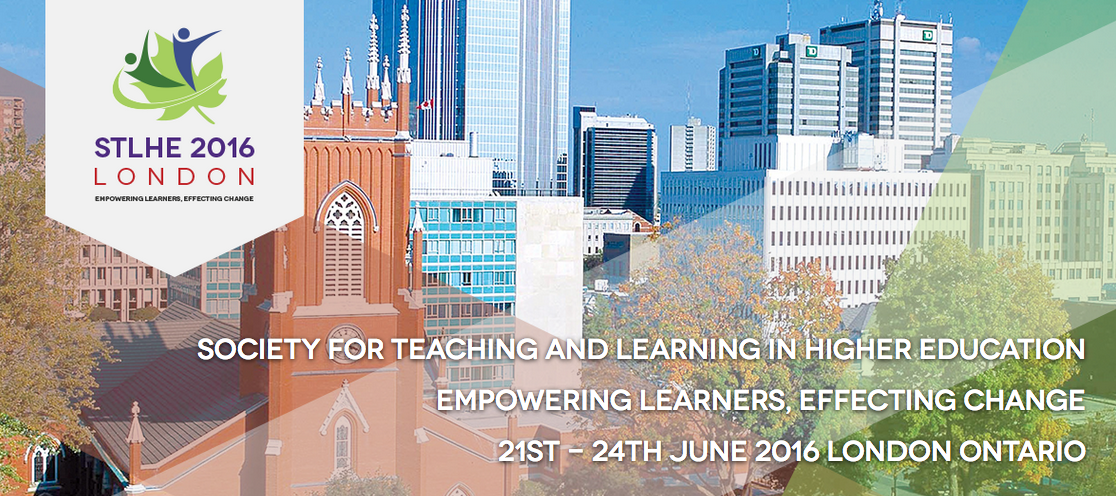Teaching and Learning in Higher Ed: a student’s perspective

This blog post is a student’s account of attending the Society of Teaching and Learning in Higher Education 2016 Conference. Karen Young is a fifth year UTSC student at the University of Toronto Scarborough studying psychology and health studies. She is a 3M National Student Fellow.
I think back to my peers who recently graduated and the anxieties and uncertainties they felt about making major decisions as their next steps. I’ve always had a considerable amount of anxiety when thinking about my future and life after graduation but I didn’t expect my anxieties to exceptionally heighten during my final semester.
A month into my final semester, I found myself setting up my first appointment at the UTSC health and wellness clinic in three years. This shouldn’t be happening, right?
It was a series of experiences attending the Society of Teaching and Learning in Higher Education (STLHE) 2016 conference between June 21-24 that made me rethink what it meant to make significant decisions that determine my quality of life down the road.
This was the second STLHE conference I attended. The first time, attending as a 3M National Student Fellow, I was surprised to learn that there was a scholarship of learning and teaching and higher education—who knew there was a collective group of people from many academic disciplines who researched, taught, and engaged in the scholarship of learning and teaching? This, paired along with STLHE’s action-packed concurrent programming, meant that this was going to be an educational buffet that I could bring back to share with others—gorging myself with some of the most passionate learners and teachers in the country.
Opening plenary
This year’s opening plenary speaker was Dr. David Helfand, Past President and Vice-Chancellor of Quest University, British Columbia. He is credited with the thought leadership behind the institutions seemingly radical design in “produc[ing] students with highly developed skills in written and oral communication who are instinctively collaborative, inherently trans-disciplinary in their approach to problems, and engaged in their local and global communities.” He kicked off his plenary with what he called three outdated assumptions that many of today’s universities base their institutional designs on compared to today’s realities. These realities echo my own learning from a journalism course and my current state of mind as a soon-to-be alumna.
- How the accessibility of information has changed. Before, information was difficult to access, limited, and expensive. With the advent of the internet, information is virtually unlimited, accessible and free. The value of university is that professors help us make sense of this information overload and foster critical thinking skills. As an alumna, staying in touch with our professors or creating a community of co-mentors who could help us make sense of this information becomes really important.
- How we are hardwired for collaboration. According to Dr. Helfand, we’re evolved for two-way communication versus one-way communication such as listening to a lecture for two hours. Often, collaboration really depends on the context of the collective issue at hand. One unique offering of universities is the high potential for rich collaboration given the condensed congregation of people from all walks of life. As an alumna, maintaining relationships with our peers who will become leaders of tomorrow couldn’t be more essential.
- How communication has decentralized over time. Before communication would be centralized and often consumed in private spaces. Nowadays, according to Dr. Helfand, it becomes too easy to live in our own world. He explains using something he called “neo-tribalism”, or using cognitive reasoning abilities to reinforce group identities. Think about deliberately following celebrities or thought leaders that confirm our interests without necessarily challenging our way of thinking things. The value of taking seemingly painful mandatory courses is that they may introduce us to new ideas we would have never otherwise been exposed to. As an alumna wanting to keep up to date with the must-knows of the day, it would be important to actively be looking for sources of information outside of my typical interests.
After listening to Dr. David Helfand’s plenary, it is clear to me the diverse social organization of community is essential to staying relevant in this information age as a soon-to-be alumna. Going forward, it is important to self-create an active community of critical thinkers from diverse backgrounds who continue to question each other’s paradigms, expose each other to new ideas, and act on opportunities for collaboration.